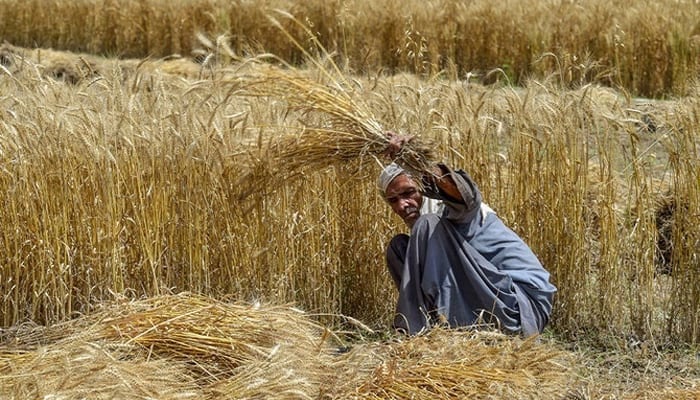Wheat harvesting has been completed in most districts of Sindh province  A farmer harvests wheat crops in a field in Pakistan. — AFP/File
A farmer harvests wheat crops in a field in Pakistan. — AFP/File
FAISALABAD: The traditional harvesting month of “Baisakh” in Punjab, the province known for producing the most wheat in Pakistan, is usually welcomed by farmers like a golden shower. However, this time, the rainfall accompanying the wheat harvesting tradition of “Baisakh” has caused losses to the crop in various districts of the province, leading to damage during harvesting, lodging of crops and delays in ripening.
Experts suggest that while individual farmers have indeed suffered losses due to the rainfall, there is not a significant risk to overall wheat production. Pakistan has set a target to produce 32.11 million tons of wheat this year, with the expectation of acquiring 25 million tons from Punjab, 4 million tons from Sindh, 1.2 million tons from Khyber Pakhtunkhwa and 1.5 million tons from Balochistan.
Wheat harvesting has been completed in most districts of Sindh province, while in southern Punjab, harvesting commenced in several districts when the rainfall occurred on the 10th of April, initiating a series of showers across most areas of the province.
According to Sardar Zafar Hussain Khan, the head of the Kisan Board, the harvesting process in the southern districts of Punjab, where wheat harvesting was underway, was not only interrupted due to the rainfall but the wheat that had been gathered in the fields after cutting has also been damaged. Apart from wheat, farmers have suffered significant losses to their straw. This is significant because straw serves as the year-round feed for livestock.
Khan stated that in the southern districts of the province, there have been reports of the wastage of four to five maunds of wheat per acre. Wheat harvesting in central Punjab usually starts on the 13th of April.
However, due to the rains occurring on the exact harvesting day, farmers’ hopes and happiness were dashed. A farmer from Jaranwala, Muhammad Tariq, said that he had prepared for wheat harvesting overnight, assembled the harvester and even called in relatives from the city. However, the morning rainfall completely halted all preparations. “The real issue is that after the wheat becomes heavy due to the rain when the wind blows, many people’s crops have been flattened, which will make harvesting difficult. Additionally, accumulation of water in the fields means that the harvester cannot enter the fields for several more days, and harvesting may be further delayed,” he said. The problems of farmers in the upper parts of the country are even more serious. The Meteorological Department has stated that the rainfall in the upper parts of Punjab province could continue for the next two to three days. Due to the rainfall, the temperature will remain lower than normal for the next few days and more rain is expected in these areas, so lower temperatures may persist for several more days.











